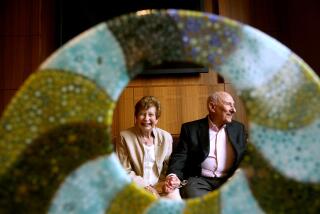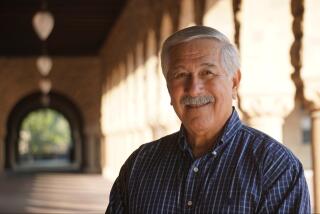Lawrence W. Levine, 73; historian’s work backed multiculturalism in higher education
Lawrence W. Levine, a former UC Berkeley historian and MacArthur “genius” grant recipient whose elegant scholarship bolstered arguments for multiculturalism in higher education, died of cancer Oct. 23 at his Berkeley home. He was 73.
Levine advocated a catholic definition of culture in several books written over the last four decades, including “Highbrow and Lowbrow, The Emergence of Cultural Hierarchy in America” (1988).
The most admired of his books was “Black Culture and Black Consciousness: Afro-American Folk Thought From Slavery to Freedom” (1977), an engaging examination of black oral expression -- including spirituals, gospel songs, folklore and humor -- that demonstrated the richness and diversity of black culture from the slavery era to more modern times.
“He was really one of the key people who invented the field of American cultural history,” said Roy Rosenzweig, founder and director of the Center for History and New Media at George Mason University in Virginia. Levine joined the history faculty at George Mason in 1994 after 32 years at Berkeley.
Particularly in “Black Culture and Black Consciousness,” Rosenzweig said, Levine demonstrated that intellectual history is “not just the study of Emerson and Thoreau but the study of Negro spirituals and folk tales. These are the intellectual and cultural achievements of ordinary people. He wanted to recover that achievement and analyze it.”
In so doing, Levine influenced his field by “redefining the content of history,” said Leon Litwack, a UC Berkeley historian who knew Levine for 40 years.
A former president of the Organization of American Historians, Levine also wrote “The Opening of the American Mind” (1996), which attracted wide attention as a forceful answer to conservative critics such as philosopher Allan Bloom, who fueled the culture wars of the 1980s with charges that political correctness was ruining the university.
The title was a deliberate takeoff on Bloom’s 1987 bestseller, “The Closing of the American Mind,” a complex treatise that blamed contemporary social movements, including feminism and civil rights, for deemphasizing Western intellectual traditions.
Levine was born to a working-class family in New York City on Feb. 27, 1933. He helped his father, a Lithuanian immigrant, run a fruit and vegetable store, even while a student at City College of New York, where he earned a bachelor’s degree in 1955, and at Columbia University, where he earned a master’s degree in 1957 and a PhD in 1962.
His early experiences “clearly had an impact on the way he saw the world,” his wife, Cornelia, told The Times on Tuesday.
He joined the civil rights movement in the 1960s, participating in sit-ins to integrate businesses in the Bay Area. He also joined other historians who marched in Alabama from Selma to Montgomery in 1965 with the Rev. Martin Luther King Jr. to draw attention to blacks’ struggle for voting rights. During the Berkeley Free Speech movement, Levine defended students who protested the ban on political activity on campus.
He later helped lead efforts to broaden cultural studies on campus. In the late 1980s he was instrumental in developing a requirement that all new undergraduates take a class on America’s racial and ethnic past.
“The Opening of the American Mind” pushed him to the forefront of the national debate about multicultural education.
He was attacked by many of the leading conservative critics, including Lynne Cheney, chairwoman of the National Endowment for the Humanities under President Reagan, who told the New York Times in 1996 that Levine’s work was an example of “the left deliberately misconstruing the arguments of its opponents while offering no substantive evidence of its own.”
He was applauded by other leading figures, such as Stanley N. Katz, then-president of the American Council of Learned Societies, who said Levine’s book “should put an end to the ‘culture war’ talk.”
Levine’s scholarly interest in the history of disenfranchised groups came after his active participation in civil rights protests, his wife said. He began to study the history of black protest but was sidetracked by an interest in black folklore. That interest led to a decade of prodigious research and analysis of songs, stories, even jokes, from plantation humor to the routines of comedian Jackie “Moms” Mabley.
Such an imaginative approach to history “helps us to recapture the joys as well as the pains, to gain some sense of a people’s angle of vision and worldview, to better understand the inner dynamics of the group and the attitudes its members had toward each other as well as toward the outside world, to comprehend the mechanisms members of the group erected to guard their values, maintain their sense of worth and attain their sanity,” Levine wrote in “Black Culture and Black Consciousness.”
Besides his wife, Levine leaves three children, Alexander Pimentel of Richmond, Calif.; Joshua and Isaac Levine of Berkeley; a sister, Linda Brown of New York City; and three grandchildren.
More to Read
Sign up for our Book Club newsletter
Get the latest news, events and more from the Los Angeles Times Book Club, and help us get L.A. reading and talking.
You may occasionally receive promotional content from the Los Angeles Times.







